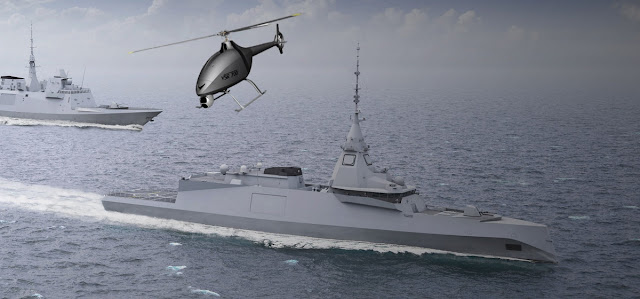France wants a naval UAV ready to enter service around
2025. Shown here is the VSR700 drone system under development by Airbus
Helicopters for military clients. (Airbus)
By: Pierre Tran
PARIS ― Naval Group and Airbus Helicopters are to launch
a technology study for a helicopter drone for the French Navy’s heavily armed
ships.
“The Direction Générale de l’Armement (DGA) signed Dec.
29, 2017, a contract with Naval Group and Airbus Helicopters for a study which
prepares for the future capability of tactical drones with a vertical take-off
from French Navy ships (the Navy Airborne Drone System),” the DGA procurement
office said Jan. 11 in a statement.
A DGA spokesman declined to provide the contract’s value.
The target is to have a demonstrator with mature
technology by mid-2021, DGA said. The demonstrator program includes flights
from a frigate.
Naval Group and Airbus Helicopters will work with
Hélicoptères Guimbal, a small to medium-sized company that builds the two-seat
Cabri G2 light helicopter, the DGA said.
Thales as well as Safran Electronics & Defense will
also work on the project, drawing on technology and capabilities on fixed-wing
drones acquired through research requested by the procurement office since
2005, the DGA said. Other small and medium companies, mostly French, will be
involved.
“The contract covers de-risking studies ahead of
construction of a future tactical helicopter drone demonstrator aboard
warships,” Naval Group and Airbus Helicopters said in a joint statement. The
project aims to conduct trials of the airborne vehicle, launch and mission
systems, working on a French Navy vessel. Onera, the aerospace research office,
is one of the main subcontractors.
Naval Group and Airbus Helicopters will act as the
program design authority, the two companies said.
The naval UAV is expected to enter service around 2025 on
the FTI intermediate frigate and other French Navy warships.
Airbus Helicopters has developed its VSR700 naval drone
based on the Cabri G2, while Naval Group has worked on integrating that unmanned
helicopter onto warship systems.
Original post: defensenews.com
VSR700, versatile and robust solution
Sea trials of a manned Cabri G2 with French Navy
Horizon-class air defence frigate Forbin. French Navy picture courtesy of
Airbus Helicopters.
Based on an innovative, versatile, robust and economical
helicopter platform, the VSR700 drone system is being developed by Airbus
Helicopters to offer its military clients the best possible combination of
multi-role performance, reliability and operating costs. This 700-kg drone,
derived from a light civilian helicopter, the Cabri G2, benefits from the
technical know-how of Airbus Helicopters in certified autonomous flight systems
and naval helicopters. A campaign of autonomous flights was started in June
2017 using an unmanned Cabri G2 prototype to validate the integration of the
flight control systems and the vehicle’s new engine system, opening the way for
the first flight of the VSR700 in 2018.
“I would like to thank the DGA and the French Navy for
the trust they have placed in the VSR700 drone which, thanks to the combined
experience of Airbus Helicopters and Naval Group, is expected to play a crucial
role in the aero-maritime operation theatres of tomorrow” declared Guillaume
Faury, CEO of Airbus Helicopters.
The VSR700 can exceed 10 flight hours of operational
autonomy with a payload capacity of up to 150 kg, offering performance levels
that have, until now, been the reserve of aircraft of a significantly higher
category and size. The system will benefit from all the know-how of Airbus
Helicopters in terms of automated flight control (the guarantee of a unique
automatic deck-landing capacity in rough seas), autonomous navigation system,
secure data link, the integration of sensors such as radar and optronic systems,
the management of complex mission systems and the certification of military
aircraft. This expertise, which builds on a heritage going back more than 70
years, allows Airbus Helicopters to design a drone system that precisely meets
the needs of the French Navy. The aerial vehicle has low maintenance
requirements and strong synergies with the ships existing logistical footprint,
thus limiting support and operations costs, while its compact size is
compatible with the simultaneous use of an on-board helicopter across different
surface ships. Source: naval-group.com
The UAV can be integrated with a range of optional
payloads, including a Thales anti-submarine warfare (ASW) module with a
sonobuoy launcher, Survitec RFD search and rescue (SAR) raft, a Safran Euroflir
410 electro-optical (EO) system, a L-3 Wescam MX-15 EO system, a Thales active
electronically scanned array (AESA) radar and a LRAD 450XL long range acoustic
hailing device.
Source: navyrecognition.com




No comments:
Post a Comment